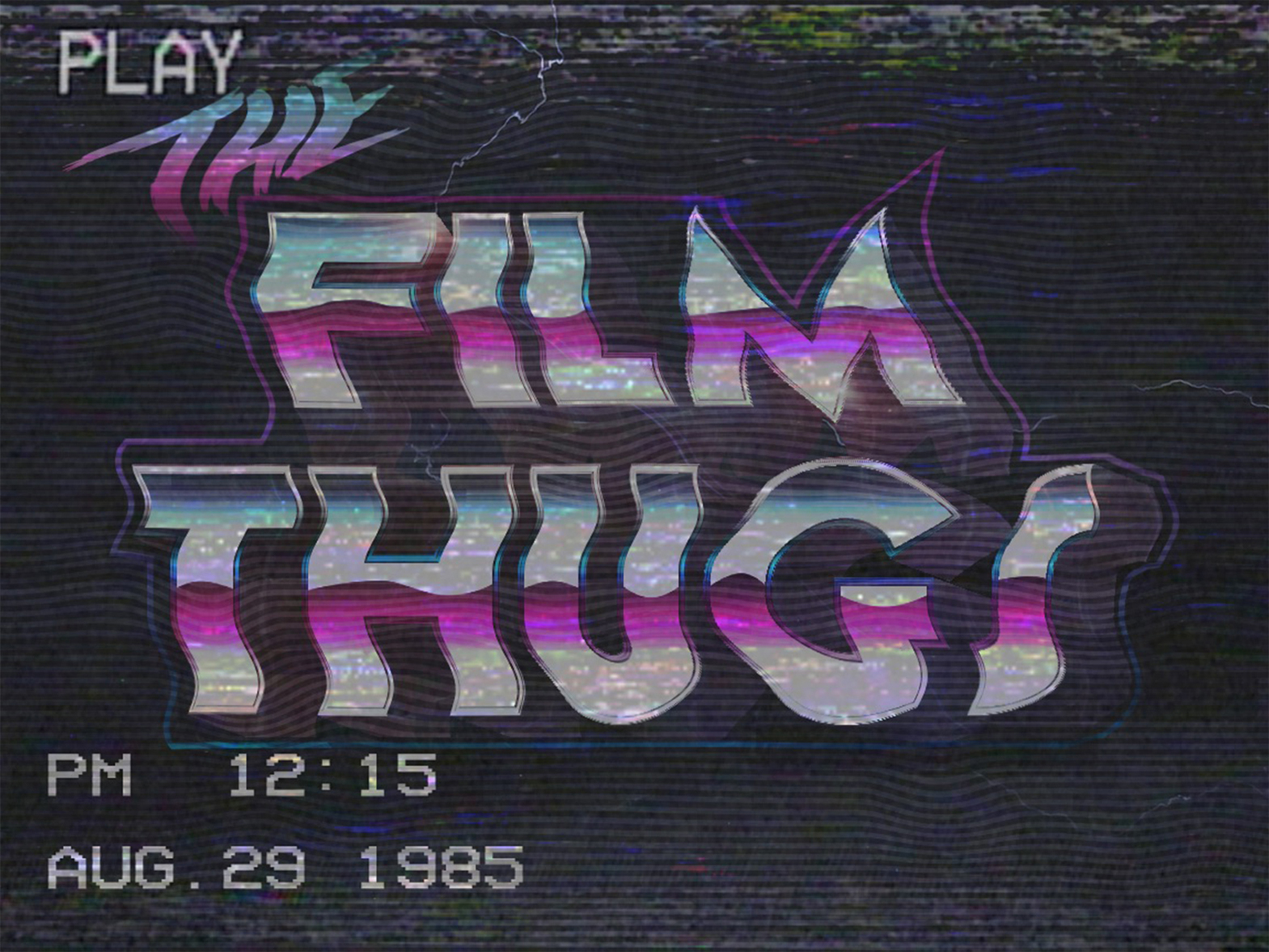Episodes
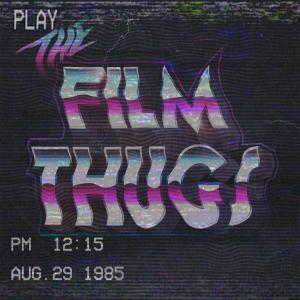
Wednesday Sep 15, 2010
Big Jim Review: Ip Man
Wednesday Sep 15, 2010
Wednesday Sep 15, 2010

I love me a good kung-fu movie. There is nothing quite like it. Think about it. I mean, honestly, what is missing there. You get some bad asses doing some bad ass stuff you can’t do. They are stronger, faster, and more skilled. It’s voyeurism at its finest.
As much as I love them there are very few, VERY few, that I would consider great films. Yes they are fun and a good diversion, but great?
That is why when I come across something that is truly great from this genre I feel like I’ve found some magic thing that I get to tell the world about.
Such is the case with “Ip Man.”
Ip Man is an actual martial arts master; know for being the first person to teach Wing Chun as a formal discipline. But he is most famous for training this guy…

Maybe you’ve heard of him?
This film begins in a typical martial arts fashion. We are introduced to the city of Foshan, which at the time was the hub of southern Chinese martial arts. There are many, many schools and the practice of kung fu is a way of life. Ip Man is an independently wealthy man who is content to spend his days meeting with friends and practicing his art by himself.
There are a few very nicely done fight sequences here that show the masters control of his art as well as his respect for those with whom he practices. When a local man who is opening a school wishes to duel with Man, he obliges. When he wins handily, he agrees to keep the duel private. That is the key to the character of Ip. He is an absolute master, but he doesn’t need to have his mastery acknowledged by others; it is enough for him to know.
Even when he comes to rescue the towns honor by defeating a northern man bent on proving his superior talent by defeating every master in town, Ip keeps his duel private.
His idyllic world is shattered with the coming of the Second Sino-Chinese War, and the Japanese occupation of his town. His wealth lost, his family home confiscated, and all hope lost he maintains a quiet dignity until he is forced to fight by the occupying General.
I don’t want to spoil any plot points, but you are dealing with a fairly formulaic movie. What makes this movie special is how it breaks from the formula. Ip is not the stoic, solitary master who refuses to use his skill to defend his town. He is, in fact, quite the opposite. He is a man who wants to provide for his family, but understands that he cannot turn his back on the suffering of his community. Nor is he the peaceful man who reluctantly goes to fight when he needs to. When the need arises, he rises to the occasion and is not averse to breaking someone’s ass apart, and handing them the shattered pieces.
This film is an odd mix of gentle and brutal and it owes that balance to the phenomenal performance of Donnie Yen as Ip Man. Yen, most known for his roles in “Iron Monkey,” and “Hero” (but who should be known for the awesomely titled "Fist That Topples Heaven and Earth,” I must hand it to Hong Kong, they got us beat to hell and back when it comes to amazing titles), as well as many stunt man/fight choreographer credits is remarkable in his portrayal. He is both passive and aggressive at the same time. This is a man who just wants to achieve perfection in his art regardless of if he gets to use it or not. He is a kind man, but he will, with purpose, wreck the shit of any fool whose shit is in need of wrecking.
The fight scenes are some of the finest I've ever seen. The distinction between sparring, where Ip is not trying to hurt but rather to help train the other fighter, and the hard combat, where he is trying to dish out some hurting is very clear and plays quite well. They are shot so that you can actually see what is going on, and each one is given some form of weight.
I could go on with positives for days. It looks amazing, the acting and relationships are wonderful, the lead character is absolutely riveting, the bad guy is not so over the top as to be unrealistic, and the tension builds at a brilliant pace. Oh, and Sammo Hung does the fight choreography, so there really isn't much more to say there.
You do not need to be a fan of martial arts movies to like this. Like "Crouching Tiger" it works even without the fight scenes, the fight scenes just add to it. It isn't a good kung fu movie, it's a good movie with kung fu in it. Do yourself a favor and check it out.

Tuesday Sep 14, 2010
Big Jim Review: Harry Brown
Tuesday Sep 14, 2010
Tuesday Sep 14, 2010
Michael Caine is a difficult actor to categorize. He has had enormous swings in both the types of characters and quality of films he has been attached to. There is no question that he is good. Anyone who can pull off the comedy of “The Italian Job,” the brutality of ”Get Carter,” the quandary that is “Alfie,” and the gentleness of, “The Cider House Rules,” not to mention winning two Oscars with another four nominations is an actor who must be respected.
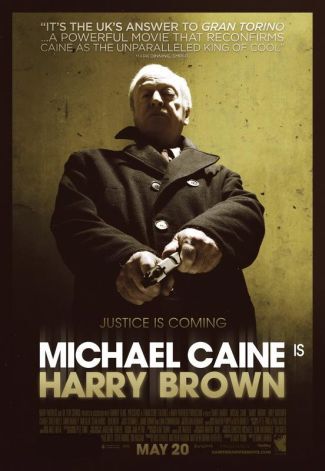
Just as hard to categorize is “Harry Brown.” If you want to take the easy road you can call it “Death Wish” meets "Gran Torino." You would be wrong in doing so, but you could do it. You would be wrong because doing so would reduce this film to a knock off, and it is anything but. While the themes and ideas of this film have been explored before none have really done it in as personal a manner as this.
Harry Brown is the kind of man who put the “Great” in Great Britain. He is a highly decorated former marine who only wants to live out his last few years enjoying the few pleasures he has left in life, even as the world around spirals into something completely foreign to him. His days consist of visiting his wife in hospital, spending time at his daughters grave, and down at the local pub having a few pints over a game of chess with his only surviving friend Leonard.
When Leonard starts getting harassed by the neighborhood hooligans Harry tells him to go to the police, keep his head down, and trust in the system. A few days later, after Harry’s wife dies, Leonard is brutally murdered. When it appears that the system that failed Leonard in life is going to fail him in death it is more than he can stand.
With nothing left in life Harry decides to do what he was trained to do, protect his island.
That being said how is this movie different from the other “Death Wish” knockoffs?
Well, that is a difficult one because it does share many characteristics with films of that ilk.
For starters it actually shows the way that the system has failed not only the victims but also the perpetrators of these crimes. The young criminals are not just “Thug 1” and “Thug 2,” they are given some sense of background and reason for their disillusionment. Be it the son of a criminal who learned first hand that the only way to get respect is by being harder than the next guy, to the man who sees nothing done to help his brother after an assault, to the young man who suffered (and continues to suffer) sexual abuse at the hands of those who should be looking out for him, all of these characters are given something to define them
This is a hard movie. There is brutality and inhumanity and a very desensitized element in it, but it is handled in a very realistic and unglamorous way. The violence is not simply thrown in without any weight. There is weight and there are consequences. The only complaint I have, and it is a small one, is about the use of CGI blood and gunshot wounds. It looks fake and distracted me at times by looking fake, but they do not detract from the movie because of the weight of everything that happens.
There is a real sense of loss throughout and it really hits home. We have all seen men like Harry. The old guy at the grocery store buying a TV dinner, or sitting in the corner of a bar by themselves they are present in our lives, but we know nothing about them. This shows how lonely, how quiet, and how frightening the world can be for people that have lost their place in it. It also shows how dangerous can be when that world pushes them a little bit too far.

Saturday Aug 14, 2010
Big Jim Review The Express
Saturday Aug 14, 2010
Saturday Aug 14, 2010
I am finally back to writing reviews. After a long painkiller induced absence I am treading out again into the world of critical writing. It may take a while to get back up to speed, but I am sure I'll get there.
Sports movies are best served by either fandom or some form of indifference, but indifference is preferable. You see, if you are a fan the events of the film become colored to suit your particular fandom, which is great if your team is on the winning side of things, and terrible if it isn't. That being said, I suffered greatly during this film.
"The Express,"which chronicles the career of Ernie Davis, the first African American to ever win The Heisman Memorial Trophy is a tragic film. It begins with a culture of racism, takes you through segregation, forces you to endure The Texas Longhorns losing of a national championship, follow that up with a Longhorn losing the Heisman trophy, and then ends with the protagonist dying at 23 from leukemia.
I know that the UT losses are not supposed to be tragic, but from my point of view, they were devastating. This is the first sports biopic that found me wanting the protagonist to lose. I didn't have anything against Davis, he was an amazing guy by all accounts, but if Jesus himself were quarterback of a team playing UT, I would be praying for him to get benched with a pulled hamstring.
My bias aside, this is a good film. It hits all the notes you want a rousing sports flick to hit. I know that it is about more than football, that the racial issues in the film are really at center stage, but in this kind of film if the action on the field doesn't work it is difficult to really get into what is happening off the field. For any sports film to work, even if sports aren't really the thematic focus, it is necessary to balance between the two.
I was reminded of "Invictus." A fine film, but as I know as much about rugby as I do about cricket, it was difficult to get into the drama of it all. That wasn't a problem with The Express.
Even though I was rooting squarely against Syracuse, and by default squarely against civil justice, in the title game, I still found myself pulled into what was going on. It is a powerful story that is told rather well. Is it clichéd at times? Yes. Of course it is, it's a sports movie. No matter what you do in this arena, you are going to hit some clichés, that's just how these movies work. Are the clichés enough to take you out of it? Not really. Davis is an interesting enough guy and someone that I knew so little about that his story really got my attention.
Even if you aren't really into sports films there is something to enjoy here. This is a moving story that is fairly well told and worth the two hours.

Thursday Jul 29, 2010
It's only rock and roll.
Thursday Jul 29, 2010
Thursday Jul 29, 2010
In the 1960's the island of Great Britain was in grave peril. It was, apparently, impossible for the most upstanding British Subject to walk down the street without being subject to the distressing sounds of rock and roll music. Evidently the only sound louder than the musical nuisance were the cries of "Good GOD!" and the crack of countless monocles as they crashed to the once peaceful streets.
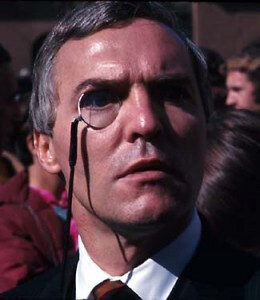
"I really must stop being QUITE so horrified!"
As a result, at a time when Britain was shaping the musical landscape in a way that the rest of the world would be following for years rock and roll music was nowhere to be found on the British airwaves. The only avenue for this genre defining music was through pirate stations that operated on ships off the coast of the island.
This is the world presented in "Pirate Radio."
What you have here is a great idea, a great cast, and an amazing soundtrack that all spend a great deal of time spinning their respective wheels in an effort to find direction. This isn't a bad movie, it's just a confused one. You are presented with some great ideas that are underdeveloped and abandoned, scattershot plotlines, and character relationships that are not defined or developed. In short, I left this movie not really caring about what happened.
The movie begins with flashy title cards that catch us up with the basics. No rock and roll on the radio, and pirate stations operation to the dismay of the government. So the powers that be do the only thing they can do. Hell, they do what any sane and logical person would do in the same situation. They bring in Kenneth Branagh, whose shock with the abomination that is rock and roll is so intense he switched to glasses to avoid the mounting cost of monocle replacement.
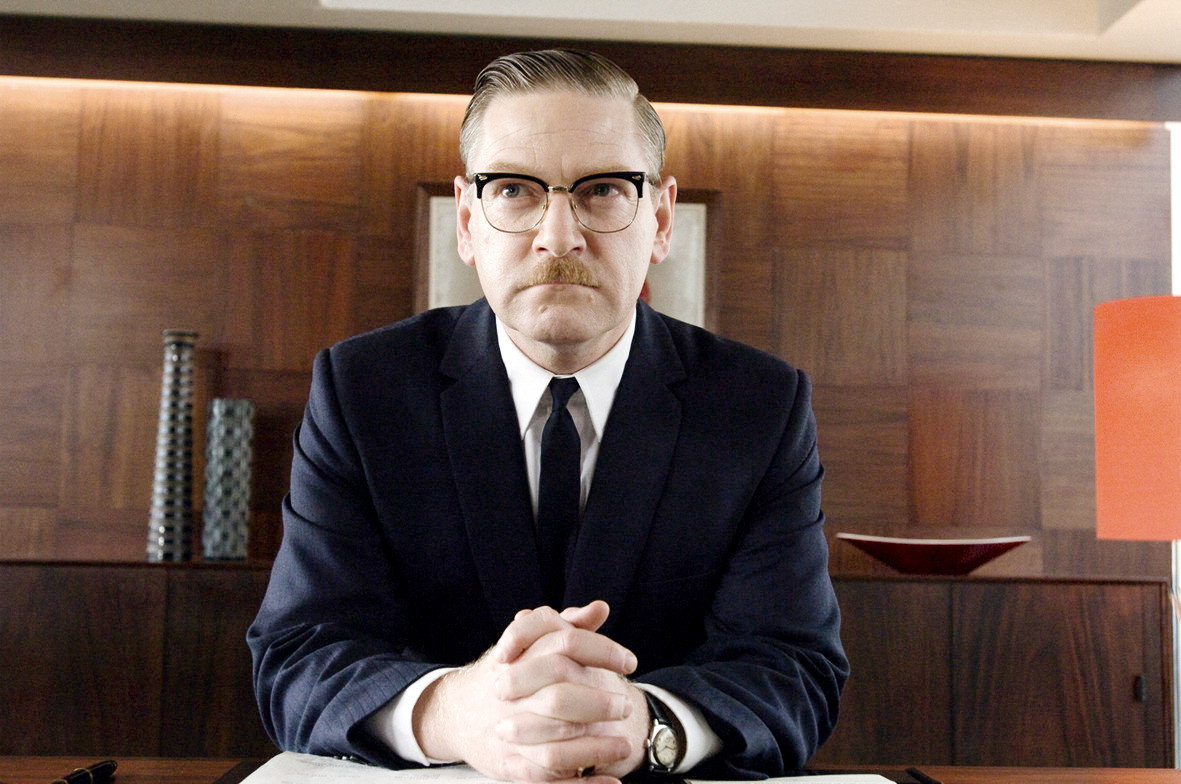
His character is so British, he literally SHITS THE QUEEN.
What I expected, rightfully so based on the previews, was the story of the station fighting government oppression to give the people the music they loved in the name of freedom. And I kind of got that. The problem here is that there isn't any direct mention of the government action until just about the one hour point. So what you do get is two stories that are kept almost completely separate. Branagh fumes and tries to intact laws, because as he says, "That's the beauty of government. If you don't like something you just make it illegal." The people on Radio Rock play music, party, and form a dysfunctional family. There is no direct interaction between those stories so there really isn't any tension throughout.
The direction is very slick and there are some really good visual touches. All of the boat scenes feel much warmer than the sterile, washed out Branagh scenes. The director finds a way to move the camera ever so slightly on the boat to give the feeling of the tide. The editing is tight from a visual standpoint, but the story could have used a bit of tightening for this to really work.
The Branagh story is the most direct and formed. He has a purpose and a goal. You see him work around setbacks, connive, and push until he is able to achieve is goal. His relationships and interactions all make sense and work towards that goal and he is set up as the perfect foil for the shenanigans aboard the Radio Rock ship.
Saying that Kenneth Branagh delivers a good performance is not only unnecessary, it is a bit stupid. He's Kenneth FUCKING Branagh for Christ's sake! When he orders a pint the barkeeper tears up. That's what the man does. This is, however, an interesting performance as it allows him to do some very difficult comedy. There are a few very obvious jokes, his assistant is a man named Dominic Twatt, and for some reason hearing one of the greatest Shakespearean actors of our time say the word "twat" never becomes unfunny. The impressive bits are the "stiff British upper lip" emotionless scenes that he plays to perfection. It's nice to get some different shades from Kenneth.
The rest of the cast acquits itself well, but you don't really get much new from them. Phillip Seymour Hoffman is great as usual, but his performance feels like a cooler version of Lester Bangs from "Almost Famous." Bill Nighy does a great mix of his characters from "Shawn of the Dead," and "Still Crazy." He stands out because he is the only person who could play this part, and he somehow pulls off feeling completely fresh, and a little bit of retread at the same time. I enjoyed Rhys Ifans' performance as the wildly popular enigmatic Gavin Canavagh, the greatest pirate DJ who ever lived. Nick Frost does a good job at creating a character removed from his brilliant turns in "Spaced," "Shawn of the Dead," and "Hot Fuzz."
I call this film frustrating because you have these, and other, solid performances floating without a rudder. Things move in one direction and you think that is where the story will go, then the director seems to get tired and moves it in another without tying that story up. I'm not saying that every move needs to fit a formula or that there is only one way to tell a story, but if you have a bunch of threads that you create well enough to get people interested in, and then don't go anywhere with them it will piss your audience off.
There are about three different movies in here. There is Young Carl, who seems like the protagonist, sent to the ship by his legendary rock chick mother (played brilliantly by Emma Thompson), you have the government vs. rock and roll story, and you have a DJ rivalry story (there is a kind of heartbreaking plot involving a marriage that takes up a bit of time, but doesn't really go anywhere). Had these episodes been treated as full stories instead of just fragments you could have had a really outstanding film. Instead, what you are left with is a bunch of decent set ups that don't really go anywhere set to a really kick ass soundtrack.

Tuesday Jul 27, 2010
The Lizard King has no clothes!!
Tuesday Jul 27, 2010
Tuesday Jul 27, 2010
There is no such thing as a movie about "The Doors." There just isn't. Oh, there are many that purport to be, but they aren't. What do exist are several documentary films and TV shows, and one feature length film about Jim Morrison and the guys who were in his band.
This isn't really much of a surprise. Morrison was one of the most charismatic figures the American music industry ever produced, and the rest of the band aren't exactly raconteurs. In any film about the band you get a shitload of information about Jim and a few talking head interviews with Robbie Krieger, John Densmore, and Ray Manzarek that last just long enough to remind you why the film doesn't focus on them more.
However, as Morrison died at 27, there isn't a whole lot of material there that hasn't been explored multiple times. "When You're Strange," attempts to mine further into the shallow pit that is Morrison.
For starters, I had some high hopes for this film. Tom DiCillo is a filmmaker who can do interesting things with minimal material. I remember watching "Living in Oblivion," at The Dobie theater in Austin many times when it came out, and being struck at how much it did with so little. It was a small film about small filmmakers that showed the insanity involved in shooting a few minutes of a film. The characters were well drawn, the dialogue was outstanding, and the situations were hilarious. This was a guy who could make a film.
Now, documentaries are a tricky area. Their success depends almost as much on the subject matter as it does on the delivery. The proper handling and set up of a documentary can make the most pedestrian of events fascinating. "Hands on a Hard Body," has no right to be as good as it is, but somehow S.R. Binder was able to take a group of people touching a pickup truck and pull a riveting story out of it. However, if there isn't a new or interesting angle in what you present your audience will have nothing to latch onto. This where "When You're Strange" runs into a problem. No matter how interesting you personally think the story of Jim Morrison is, there is nothing new or surprising here. It is a repackaging of a lot of well worn information and no matter how nice the new package is it's all stuff you've seen before.
This movie lives or dies depending on your feelings towards Jim Morrison. Here is a simple test that will tell you how you will react to this movie.
Finish the following sentence:
I think Jim Morrison is...
If your sentence contains either praise or total ignorance of the man then you will most likely dig this film. If you are critical, apathetic, or dismissive... maybe you should check out "King of Kong."
If you answered a or b you will probably really dig this. If you answered c or d...
I've been through a journey with the man that ranges from curiosity to fascination to adoration until I landed firmly on amusement. Put simply, he was a decent lyricist and a shitty poet who became a cultural icon before his excessive indulgences reduced him to a self parody. He is not some Bacchanalian poet warrior shaman; he was a good looking kid who could write some ok songs and crafted a public persona that was perfect for the time in which he lived. He was a kid who didn't know how to say no to anything and was able to portray himself as far deeper than he was because that's what a lot of young people needed at the time. "Break on Through" is a pretty awesome song though.
The only thing that stands out about this film is the new and interesting footage they used in it. There is some very up close and natural footage that makes "The Doors" in concert seemed a step away from a full blown riot. Johnny Depp acquits himself nicely as narrator, but there is a seriousness that permeates the film that makes it hard for me to take seriously. Morrison was a songwriter who drank a lot, HE WASN'T NELSON FUCKING MANDELLA. This film, like almost every other on the subject makes him look like some spirit guide for a generation who represented freedom and enlightenment while disguising every interview that makes it very clear that he was a rather selfish egotist who represented escape and irresponsibility.
This is a well made film that kept me wishing the director had chosen another subject, a different band. It is very well made, moves along nicely, and displays an incredible amount of talent for documentary film. It's just that we've heard enough about Morrison and this didn't teach us anything new. The filmmaking deserved better.
I think my feelings can be summed up this way. I watched this late at night, trying to fall asleep. At about 3:30 in the morning, after 81 minutes of hearing about a man whose drug problems were so intense, and had such a negative impact on his personality that band mates refer to him as two different people depending on his sobriety, a man who missed recording sessions, and collapsed during shows Depp leaves us with the thought, "you can't burn out…if you were never on fire," and I almost passed out from laughing. That about sums it up for me.

